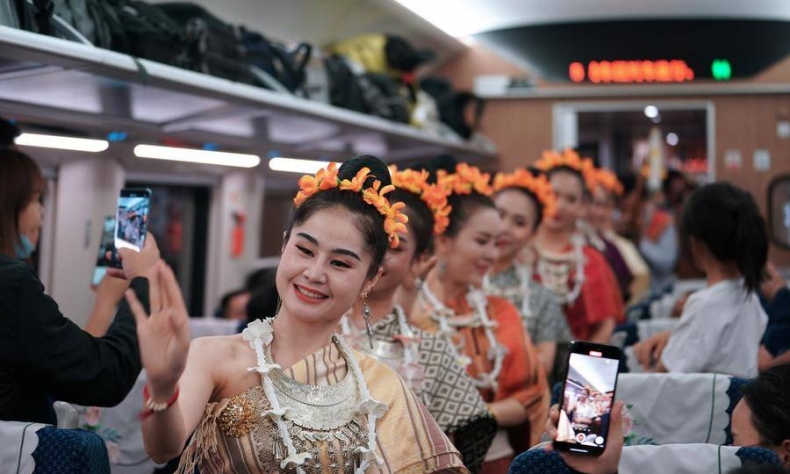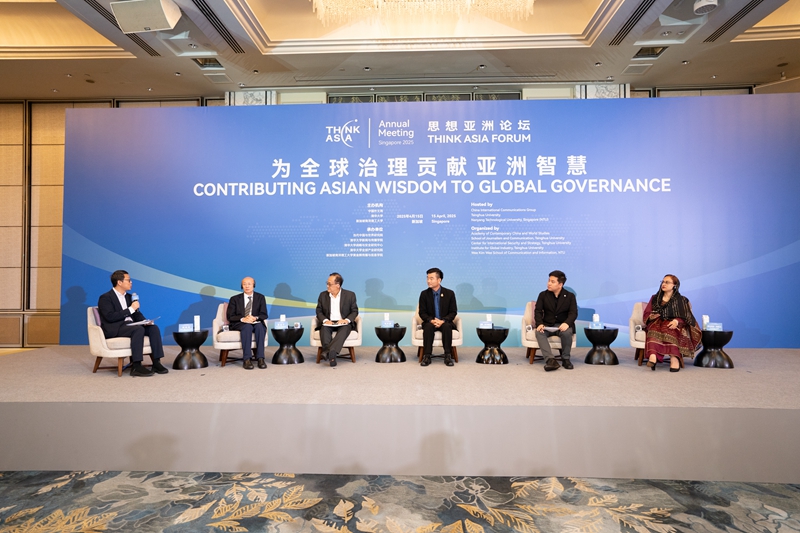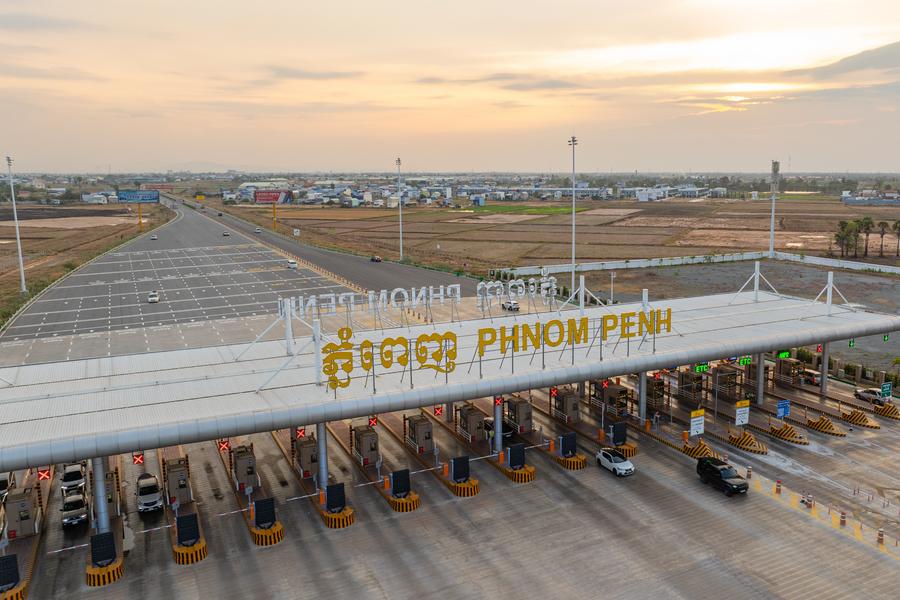Think Asia Forum Provides Insights for Asian Countries Amid Global Uncertainties

Since Asian countries value relations and cooperation with neighboring countries, they should seek regional collaboration to address uncertainties.
The world is facing mounting uncertainties and challenges, especially due to geopolitical tensions and rising unilateralism and protectionism. Particularly, many countries have been increasingly concerned about erratic U.S. policies causing global instability.
Against this backdrop, the 2025 Annual Meeting of Think Asia Forum kicked off in Singapore on April 15, providing insights on impacts of the recent U.S. tariff hikes on trading partners and how Asian countries can jointly cope with common challenges.
The event was co-hosted by the China International Communications Group (CICG), Tsinghua University and Nanyang Technological University (NTU).
The forum has developed into a key platform for exchange between think tanks and media in the region, providing insights for promoting cooperation and development since its first edition in 2022, Cao Zhongming, Chinese Ambassador to Singapore, said at the meeting.
Insightful exchanges
“The recent U.S. tariff hikes have adversely affected the world economy,” Cao said.
He called on Asian countries to jointly maintain global economic stability and underscored that China will continue to open up wider and share the benefits of its development with the world.
Yu Yunquan, CICG Vice President, told the forum that the recent U.S. tariff policies are exacerbating global uncertainty, affecting wellbeing of all people, including those in the U.S. Many Asian countries are developing and emerging economies, which rely on export-oriented industries and are vulnerable to the deteriorating international trade environment, according to him.
“As a responsible major country, China advocates maintaining the multilateral trading system and opposes unilateralism and protectionism,” Yu said, adding that China expects to engage in equality-based exchanges and dialogues with the U.S to address mutual concerns.
The forum should develop itself into a platform for contributing strategic ideas and fostering mutual understanding among Asian countries, Yu said.

“The international trading system, with the World Trade Organization at its core, is facing significant challenges. China’s firm countermeasures against U.S. abuse are in defense of its own interests and also aimed at safeguarding the WTO-led global trading system and preventing a law-of-the-jungle scenario,” Zhu Guangyao, former Vice Minister of Finance of China, told the meeting.
“The world is at a crossroads of either building a community with a shared future for humanity, or seeing individual countries prioritize their own interests over the common good and forcing their self-established rules on other countries,” Chen Wenling, chief economist at the China Center for International Economic Exchanges, told a symposium of the forum, noting that China has been safeguarding its legitimate interests, while also defending the multilateral trading system.
According to Chen, the U.S. tariff hikes have led to rising commodity prices. Washington’s policies will disrupt the global trade order and end up affecting the U.S. itself, she warned.
Ernst Kuipers, NTU Vice President (Research), told the meeting that NTU is working on research for addressing major challenges like climate change and aging population, and the forum provides a platform for universities and institutions to better cooperate and play their roles.
Joining hands
Asian countries account for over 40 percent of global economic output and trade volume, with the regional prosperity key to global economic growth, Chen said, adding that China-ASEAN cooperation is driving Asian economic integration.
“Despite the U.S. tariff hikes, the deeply interconnected supply and industrial chains and established trade and investment partnership between China and ASEAN countries will remain,” she noted.
Zhu suggested Asian countries develop mechanisms for currency cooperation against financial risks. He also called for the signing of the China-Association of Southeast Asian Nations (ASEAN) Free Trade Agreement 3.0 by the end of this year. The agreement aims to eliminate more tariffs, while expanding cooperation in the digital economy and other emerging industries.
Asian countries should develop closer regional cooperation and multilateral dialogues to inject stability into global governance in response to the current fluctuations, Farid Shafiye, Chairman of the Baku-based Center of Analysis of International Relations in Azerbaijan, said at the meeting.
He stressed the importance of jointly building an inclusive, mutual trust-based and sustainable regional order through infrastructure connectivity, digital cooperation and security coordination.

“Asian countries need to focus on their own development to cope with global challenges. Since they value relations and cooperation with neighboring countries, they should seek regional collaboration to address uncertainties,” Chan Soo Sen, former Minister of State of Singapore, told the meeting, adding that Singapore is improving its weak areas in the face of disrupted global trade, and seeks to join hand with other Asian countries.
Alfred Schipke, Director of the East Asian Institute (EAI) at the National University of Singapore, said at the meeting that Asian countries today have the potential to become major drivers in the world, but they should continue to make institutional reforms.
Asian countries should enhance trade, investment and financial cooperation, and build more international partnerships to help reshape global governance system, he added.
Addressing the meeting, Hu Zhengyue, former Assistant Minister of Foreign Affairs of China, called on China and ASEAN countries to jointly enhance the connectivity of industrial and supply chains and improve cooperation on new energy and AI.
“China will continue to widen its doors and further cooperation with neighboring countries, sharing its fruits and contributing its ideas to global governance,” Hu said.
Chen Gang, Assistant Director of EAI, said at a symposium of the meeting that Asian countries should continue to promote free trade, as many of them have seen an annual economic growth rate of 5 to 6 percent in recent years, with large labor forces and booming consumption.
He highlighted that Asian countries are finding new competitive edges to spur on their development. In recent years, trade between members of the Regional Comprehensive Economic Partnership (RCEP) has improved. The RCEP is a free trade pact comprising the 10 ASEAN member states and their five trading partners, namely China, Japan, the Republic of Korea, Australia and New Zealand. The landmark RCEP is the world’s largest free trade deal to date. The RCEP countries account for roughly 30 percent of the world’s GDP and population.
“Asian countries should expand domestic demand to reduce reliance on exports to the U.S. and address imbalanced foreign trade,” he said.
Mustafa Hyder Sayed, Executive Director of the Pakistan China Institute, also warned at a symposium of the meeting that U.S. has weaponized tariffs to serve its political agendas.
Asian countries should strengthen cooperation through the Asian Infrastructure Investment Bank, a Beijing-headquartered multilateral development bank with a mission to enhance social and economic progress in Asia, the New Development Bank, a multilateral development bank established by the BRICS group of emerging economies, and the Belt and Road Initiative, a China-proposed initiative to boost connectivity along and beyond ancient Silk Road routes. The Chinese currency, or RMB, should also play a bigger role in trade between Asian countries, Sayed said.
 Facebook
Facebook
 Twitter
Twitter
 Linkedin
Linkedin
 Google +
Google +










